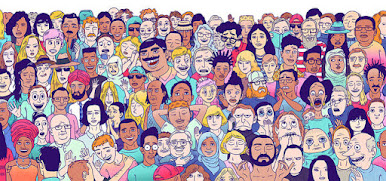Cultural Paradigms-5/14/22
Cultural Paradigms-5/14/22
Cultural Paradigms are a fascinating subject. Paradigms are how we look at things, it is our perspective on something. In culture, paradigms are everywhere. In the United States, our views on clothing, food, and morals are very different from a place such as China. Yet within the United States, there are also many paradigms. Utah has a much different culture than New York. In Utah, Sunday tends to be a day for family and God, whereas, in New York, it may be culturally acceptable to shop and do yard work. Though even that paradigm is shifting in Utah.
As a child, I lived in Germany. I remember while on a field trip to the lake, being shocked to see women laying on the dock, topless, and men fondling and kissing them. There were about half a dozen ladies and men, laid out like it was the normal thing to do. In America, you would be arrested for indecency. That is an example of a cultural paradigm. What is acceptable in Germany, is very unacceptable in America, and being in a bathing suit at the lake in America, would be very unacceptable in Sadia Arabia.
When I was a teenager, I was obese, and I hated walking into my classrooms at school. I didn't like anyone looking at me, or sensing my presence. I once told my English teacher this and she told me that in a different time, I would be considered wealthy because my size would mean that my family had money to feed us well and we were not starving. Ever since this conversation with my teacher, I had a little different outlook on the reality of perceptions and judgment.
Should we let our social or cultural paradigms determine our worth? Obviously, the answer is no. But if the answer is so obviously no, then why do we do just that all of the time? The answer is that we are so ingrained in our culture, that we don't even realize the paradigms under which we live. Sometimes we are appraised of these things and our views shift, but it usually takes a life-altering event to bring us to that new knowledge.
Many people come to realize our cultural paradigms when they travel outside of their home country and they see the different thought processes or paradigms that exist. I have a friend from Hawaii. She tells the most amazing and terrifying stories of her childhood. Her stories are unreal to us, stories of survival after hurricanes and the responsibility she had to take on. She also told us that her grandmother chose to raise her, which meant that grandma asked for her and her parents had to oblige because that was the culture. That is when she came to the United States, far away from the rest of her family. In the culture that I grew up in, a grandparent can't just ask to raise your child and you give your child up, because that is respecting your elders. This idea seems very foreign and even wrong to me, but in her culture, it was the norm and nothing strange was thought of it. We need to expose ourselves to more thought processes throughout the world so that our paradigms do not cause us to have ill thoughts towards others because they think and act differently than us.
A few years ago, I was able to help a refugee family settle in a new land. This family had very different paradigms than I was accustomed to and they felt the same way about me. We worked hard to find common connections to build our friendship, which truthfully was very easy. There were a few differences that stood out more than others that we had to work through. One of which was that women were not respected. The teenage boys treated American women with respect because they could feel the difference due to the fact that the women in America act with great confidence. But women in these boys' cultures, especially their mothers were treated very small. We had to help these boys learn a new way of life. In Africa, that was acceptable, but in America, that is not. We had to teach them a new paradigm.
When in Rome do as the Romans do, is a very common saying. We should not necessarily heed those words, but we should at least acknowledge other cultures' paradigms and realize that those thoughts do not necessarily make a person good or bad. I believe that if we were to expose ourselves and our children to a variety of paradigms, the world would be much more accepting and tolerant of each other. We might even find we would like to shift our paradigms.



Comments
Post a Comment